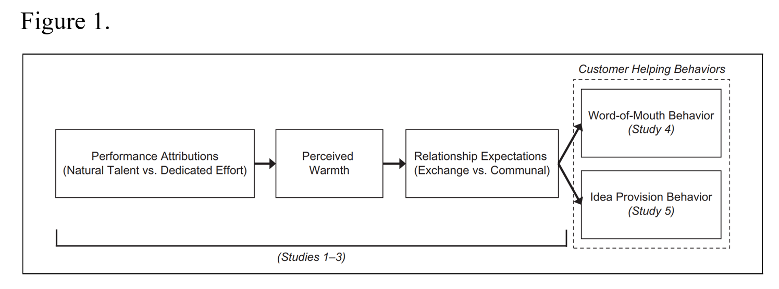Marketing Your Agents: Effort vs. Talent
Fine F. Leung, PhD, Sara Kim, PhD, and Caleb H. Tse, PhD
When highlighting the exceptional performance of their service employees, firms often credit the success to either sheer effort or natural talent. This same trend is seen in the real estate market, as brokers attribute the high performance of their agents to effort or natural talent. For example, an agency may advertise that “Our agents work tirelessly to get our customers the best price possible,” or “The talent of our network ensures that properties are sold an average of 2x faster than competitors.”
As real estate firms promote performance of their agents’ effort and talent, however, it is unclear what effect this type of marketing has on prospective clients’ evaluation of the agents and client outcomes.
About our Study
Social psychology and marketing research have shown that impressions about others are usually formed by two perceived factors—competence and warmth. This study focuses on the relationship between competence and warmth, and more specifically, how the dimensions of competence, dedicated effort, and natural talent are related to a perception of warmth. We also examine how the warmth-competence framework and performance attributes influence the dynamics of client-employee relationships.
Although real estate firms can create client relationships in other ways, such as providing exceptional customer service, these tactics require interactions with the client. This research is the first of its kind to model how firms can build expectations of relationships with potential clients through their marketing communications apart from actual sales interactions.
Effort
Perceived effort or competent performance are believed to be the results of commitment, perseverance, and hard work. Research demonstrates that highlighting a real estate agent’s dedicated effort leads clients to expect a more communal relationship experience due to the perceived warmth of the salesperson. When performance is attributed to effort, a consumer views the agent as “one of them,” because most people believe they must exert a high amount of effort to succeed. This perception on the part of the customer causes the salesperson to be viewed as warmer than those who are viewed as socially distant or members of the “out group.”
Perceived warmth creates a consumer expectation that the real estate agent will be communally focused and prioritize a relational experience. Consumers will assume agents will go above and beyond to take care of them and consider their individual needs. Perceived warmth and communal experiences lead clients to increased word-of-mouth behaviors and sharing new product ideas or improvements with the agency (see Figure 1).
Talent
Talent is believed to be the result of innate aptitude. When firms highlight natural talent in marketing, a client will tend to view real estate agents as cold, and previous research has shown that highlighting natural talent increases perceived social distance. Prodigies or masterminds are viewed as having something that others do not. Perceived dissimilarity increases the likelihood that clients will view the agent as self-centered, having a limited emotional capacity, and disconnected from human experience.
Although all interactions to some degree are transactional-based, academic research considers communal and exchange-based interactions on a sliding scale. Lack of warmth leads to exchange-based relationship expectations. An agent may be viewed as “instruments for their own goals.” Clients will view the agent as strictly a business partner and will expect the agent to provide services that are worth their money. These interactions bring about less helping behavior from the customer in the form of WOM and idea provision.
Managerial Implications
As real estate firms highlight performance effort and talent, they should strategically try to create expectations that parallel their service propositions. Firms that emphasize communality in their service should attribute agent performance to effort, affirming the client’s expectation of a more communal relationship. If these same firms emphasize talent and indicate a more exchange-based relationship, client’s communal relationship expectations may be unmet and will lead to service dissatisfaction.
Results of our study also established that clients pay attention to specific types of employee information depending on whether performance effort or talent is stressed. If firms want consumers to pay attention to clients’ personal information, they should attribute the employee’s performance to effort. On the other hand, if firms want clients to focus on job-related information, they should highlight the talent of the agents.
Performance attributes also influence client helping behavior. When firms highlight effort in performance, they will encourage word-of-mouth behavior and service ideas. Word-of-mouth is considered one of the most “significant developments in contemporary consumer behavior,” because of its ability to influence the way clients make purchasing decisions and affect sales. Involving clients in new products or service ideas enhances new product financial performance. Clients may engage in other-helping behaviors, such as participating in firm activities and helping the agent’s other customers.
Conclusion
The importance of aligning a real estate marketing strategy with service objectives is crucial. Begin forming expectations of relationships with clients, even before they pick up for the phone or set foot in your office. Carefully selected wording when describing your employee’s performance can boost perceived warmth, word-of-mouth behaviors, and idea provision.
. . . . . . . . . . . . . . . . . . .
Recommended Reading
Leung, Fine F., Sara Kim, and Caleb H. Tse (2020), “Highlighting Effort Versus Talent in Service Employee Performance: Customer Attributions and Responses,” Journal of Marketing, 84(3), 106-121.
. . . . . . . . . . . . . . . . . . .
About the Authors
Fine F. Leung, PhD
Assistant Professor of Marketing, Hong Kong Polytechnic University
Dr. Fine Leung’s (PhD – University of Hong Kong) core research interest is in marketing strategy, with a focus on research topics relating to customer relationship management, influencer marketing, customer participation, and services marketing. Prior to her graduate studies, she had years of marketing experience in a leading consumer product company in China. She had also worked in a global investment bank covering the consumer and retail sectors in Asia.
Sara Kim, PhD
Associate Professor of Marketing, University of Hong Kong
Dr. Sara Kim’s (PhD – Chicago Booth) research focus is on consumer and managerial decision making and its implications for marketing management. She is particularly interested in antecedents of consumers’ sense of self including self-affirmation, identity threats, mortality salience, and implicit theories of personality, and the impact of consumers’ sense of self on various consumer judgments and behaviors such as consumer emotions, word-of-mouth, prosocial behavior, and anthropomorphism. Her work has appeared in such publications as Journal of Consumer Research and Psychological Science. Her research has received media coverage by outlets such as New York Times, Time, Science Daily, and Medical News Today.
Caleb H. Tse, PhD
Assistant Professor of Marketing, Nanyang Technological University
Dr. Caleb H. Tse’s (PhD – University of Hong Kong) main research areas include marketing strategy (customer co-creation and innovation), international business (counterfeiting, learning by exporting), and advertising (celebrity endorsement, cross-platform advertising). His research has been published in Journal of Marketing, Journal of Management, Journal of International Marketing, Journal of Business Research, Journal of World Business, Journal of Advertising, Journal of Advertising Research, and International Journal of Advertising. He serves as an editorial board member of International Journal of Advertising.

